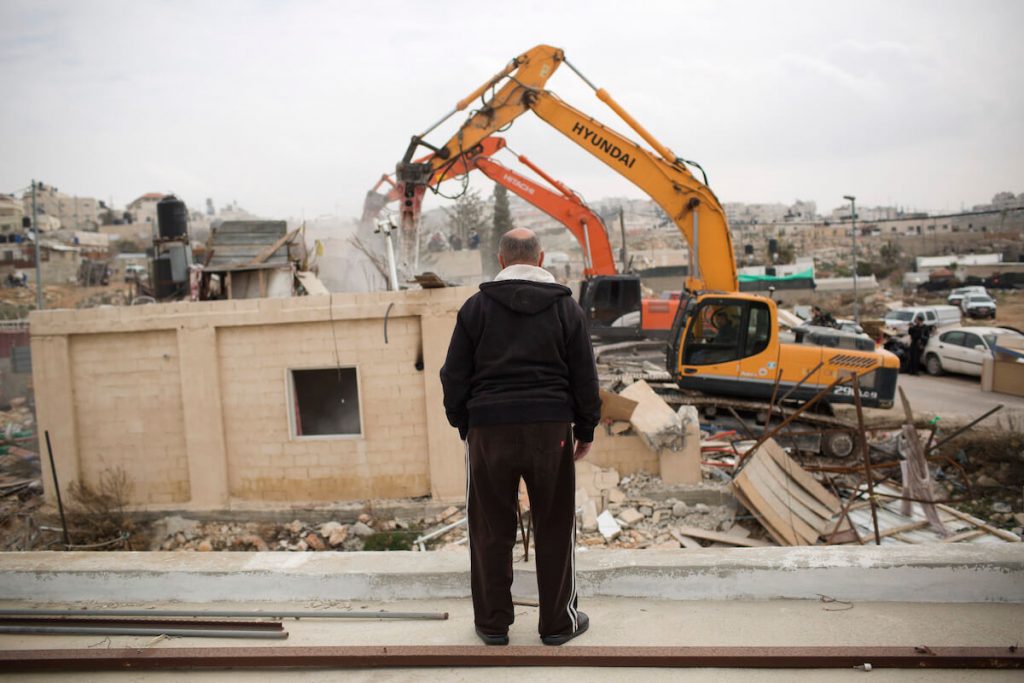- About Us
- Policy Center
- Learn
- Press Room
- Blog
- Get Involved
- Donate
- Donate to J Street Online
- Make a Gift in Someone’s Honor or Memory
- Make a Monthly Gift
- Tax-Deductible Donations
- Giving by mail
After pledging to unilaterally annex roughly a third of the West Bank in last year’s election campaign, Israeli Prime Minister Benjamin Netanyahu has now hit the pause button on formal annexation as part of a diplomatic agreement with the UAE. Netanyahu says annexation remains “on the table” despite the agreement, and, perhaps even more concerningly, the Israeli government is ramping up its decades-long campaign of ‘creeping annexation’ in the West Bank with rising levels of home demolitions and settlement construction.

Bedouin children attend improvised class in the village of Abu Nuwar, West Bank, after the Israeli army demolished their two-classroom school in the West Bank on Sunday ( AP )
Since Israel took control of the West Bank following its victory in the Six-Day War of 1967, the Israeli government has supported settlement construction on captured, occupied territory. This policy commenced just months after the end of the war, with successive Israeli governments basing much of their settlement policy in the first decade of occupation around what was known as the ‘Allon Plan’, which envisioned the annexation of large parts of the West Bank.
The settlement movement had an even more expansive view of Israel’s right to the occupied territory, pushing for the government to support Israelis in building settlements — and displacing Palestinians — across the entire West Bank. With increasing encouragement from the government, the number of Israelis living in the West Bank has ballooned from just 1,500 in the early years of occupation to almost 430,000 in the broader occupied West Bank and 220,000 in occupied East Jerusalem.
Paving the way has been a process of dispossession and land seizure designed to expand Israeli settlements and restrict the territory available to the roughly 3 million Palestinians who live in the region. The process has involved the weaponization of zoning regulations and construction permits, the demolition of Palestinian homes, schools and medical facilities and a refusal to recognize private property rights. It’s a project which not only violates international law and the Palestinian people’s right to self-determination, but which jeopardizes hope for a two-state solution, makes territorial compromises increasingly difficult and threatens Israel’s long term future as a democratic homeland for the Jewish people.
Despite growing outrage at the Israeli government’s plan to formally annex portions of the West Bank and an increasingly deadly global pandemic, Israeli authorities have intensified land seizures and demolitions in recent months. The Israeli human rights NGO B’Tselem has reported that, “in June alone, Israel demolished 30 Palestinian homes in the West Bank (not including East Jerusalem) – the same number demolished throughout the entire first five months of 2020.” B’Tselem also observed that “June demolitions left 100 Palestinians, 53 of them minors, homeless.”

While Netanyahu has made annexation an integral part of his political agenda in 2020, Israeli settlement policy in the West Bank has a much longer history. Settlements have been expanding in the West Bank since Israel’s 1967 victory, although the government’s full-throated embrace of the settlement movement is a more recent development.
Originally, government support for settlements in the West Bank was guided by the Allon annexation plan, drawn up by Israeli Minister Yigal Allon. The plan envisioned annexing much of the West Bank to Israel as a security perimeter — including most of the Jordan Valley along Israel’s border with Jordan — and creating two disconnected territories for Palestinians. This policy guided government support for settlements deep into the West Bank. For Palestinians, it meant displacement from areas marked out for annexation, including the West Bank’s most arable agricultural land in the Jordan Valley.
Meanwhile, a more radical, religiously-driven settlement movement was committed to having Jews settle land across the entirety of “Judea and Samaria,” the biblical terms for the West Bank region. These advocates established settlements in religiously and historically significant areas of the West Bank, such as Hebron, in defiance of the Israeli government, leading to clashes between settlers and the Israeli military. In the years since, successive governments became increasingly supportive of both visions of settlement.

Government support for settlers staking their claim in Hebron was initially divided, today hundreds of troops defend Israeli settlers living in the heart of the West Bank city.
By the late 1970s, the government was offering housing benefits and tax concessions for those moving into settlements, and today it provides military protection for many non-official outposts extending beyond official settlement zones. Authorities continue to use planning laws, infrastructure projects and land requisitions to dispossess Palestinians of their property and preserve territory for Israeli development.
Today, almost 430,000 Israelis live in 132 official settlements in the broader West Bank with an additional 220,000 Israelis settlers living in occupied East Jerusalem. In addition to official settlements, settlers have established 124 independent outposts in defiance of Israeli law. Even though Israeli law deems outposts illegal, the Netanyahu government provides them with military protection and access to water, electricity and other basic services. Over time, as outposts expand and become entrenched, many undergo a “legalization” process to become officially recognized as settlements.
For Palestinians, the result of the spreading settlements and outposts has been the loss of land, the demolition of houses and infrastructure, the inability to maintain and expand agricultural developments and a shrinking area of land available for a future Palestinian state.
The Israeli government’s planning permit program is one of the most insidious and destructive tools used to dispossess and displace Palestinians in the West Bank. Planning permits determine the legality of structures built on West Bank land under Israeli control and whether they’re subject to demolition orders. While the government readily grants these permits to Israeli settlers, applications by Palestinians are almost universally denied.
Since 1967, the Israeli government has granted 99.8% of its land allocations in the West Bank to Israelis. Amnesty International reports that permits are “virtually impossible for Palestinians to obtain,” with Haaretz noting that Israeli authorities rejected “over 98 percent of Palestinian building permit requests in West Bank’s Area C” between 2016 and 2018. A study by the Israeli group Peace Now found that between 2009 and 2016, just 66 permits in Area C were granted to Palestinians, compared to 12,763 for Israeli settlers. Meanwhile, the American Friends Service Committee notes that “more than 100 outpost settlements in the West Bank are all built without permits or plans, but rarely receive demolition orders.”
Demolition orders are, however, a common occurrence for Palestinians. Every year, thousands of Palestinians are affected directly and indirectly by demolitions of homes, businesses, power utilities, water infrastructure and other services they rely upon. Since 1967, almost 50,000 structures have been demolished, including hundreds of EU, UN and other internationally funded aid projects. This includes the demolition of farms, apartment buildings, infrastructure projects, schools and medical facilities.

A Palestinian woman argues with Israeli soldiers who are demolishing animal shelters on her family farm.
Last year, across East Jerusalem and the broader West Bank, more than 600 Palestinian structures were demolished with more than 900 people made homeless. These figures don’t account for self-demolitions carried out by Palestinians seeking to avoid fines and other penalties. Dozens of West Bank schools are also currently at risk of full or partial demolition. So far in 2020 — despite the increasing threat of COVID-19 in both Israel and the Palestinian territories — more than 350 structures have been demolished and almost 400 Palestinians displaced.
The Israeli government’s discriminatory usage of planning permits and demolitions has severely impacted Palestinian society in the West Bank. Layered on top of these abuses is a system which restricts freedom of movement for Palestinians in the West Bank, including requiring permits to visit certain areas, checkpoints which can take hours to pass through and periodic or permanent shutdowns in certain areas. The United Nations Office for the Coordination of Humanitarian Affairs (OCHA) notes that “many of these restrictions have been justified by the Israeli authorities as means to address security concerns, which often include the protection of settlements established across the West Bank, in contravention of international law.”

A Palestinian man watches as his house is demolished by Israeli authorities in East Jerusalem.
The OCHA notes that displacement in the West Bank places “immediate and longer-term physical, socio-economic and psycho-social impacts on Palestinian families, particularly on children.” Many displaced Palestinians reside in refugee camps and often lack access to proper healthcare, financial resources, or educational opportunities, with demolitions and overcrowding now heightening the risks of COVID-19 transmission and limiting Palestinians’ ability to respond.
The EU, UN and the vast majority of the international community have stated that Netanyahu’s plan to annex up to 30% of the West Bank is a clear violation of international law. The same is true of the Israeli government’s creeping annexation policies. Under the Fourth Geneva Convention, of which Israel is a signatory, it is unlawful for an occupying power to transfer parts of its own civilian population into the territory it occupies, or to destroy or appropriate property unless absolutely necessary for military purposes. As recently as 2016, the UN Security Council reaffirmed the illegality of West Bank settlements, expressing “grave concern that continuing Israeli settlement activities are dangerously imperilling the viability of the two-State solution.”
The International Court of Justice also affirmed the illegality of West Bank settlements in a 2004 decision, but the US State Department’s legal advisor determined that Israeli settlements were illegal under international law much earlier — in 1978. For decades, this was America’s official position under both Republican and Democratic administrations. That lasted until November 2019, when the Trump administration declared that settlements were “not inconsistent with” international law. This gave Israel tacit American approval to continue with settlement expansion.

President Trump’s permissive attitude has led to increasing rates of demolitions and settlement construction.
The Trump administration’s position reverses decades of bipartisan policy which held that not only were settlements illegal, but that they undermined security and threatened the viability of a peace agreement. In 1982, Ronald Reagan called for “the immediate adoption of a settlement freeze,” stating that “further settlement activity is in no way necessary for the security of Israel and only diminishes the confidence of the Arabs that a final outcome can be freely and fairly negotiated.” In 1991, President George H.W. Bush withheld loan guarantees and successfully pressured Israel to pause settlement construction. Presidents Clinton, Bush and Obama also pressured Israel to pause construction, though through all administrations since 1967, settlements have continued to expand.
The Trump administration’s permissive attitude, however, has led to an acceleration in settlement approvals and construction projects in recent years. These contrasting approaches not only demonstrate the danger of the Trump administration’s shift, but that America’s strong relationship with Israel delivers significant influence — one which can be exerted to prevent destructive steps such as settlement construction and annexation.
For decades, creeping annexation has increased the area of West Bank land under Israeli control and prevented the prospects for Palestinian statehood under a negotiated peace agreement. It’s a project that has nothing to do with Israeli security and puts the hope for a secure, democratic homeland for the Jewish people — with clearly defined and recognized borders — further out of reach.
Formal annexation, as threatened by Prime Minister Netanyahu, would double-down on this commitment and institutionalize an undemocratic system in which the Israeli government would permanently rule over millions of stateless Palestinian residents. It’s a move that would undermine hope for a negotiated peace agreement, betray Israel’s founding principles of democracy and equality and threaten the long-term sustainability of the US-Israel relationship.
Join J Street to stand alongside progressive partners in Israel and the USA to fight for a better future for Israelis and Palestinians